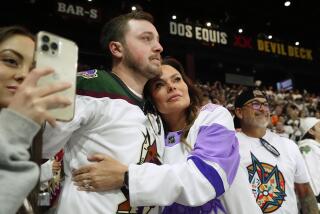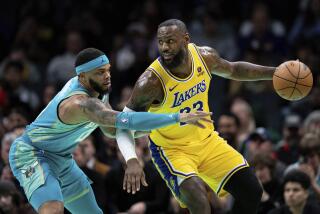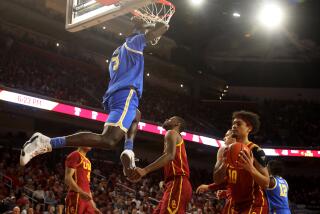This Turned Out OK
- Share via
OKLAHOMA CITY — Where?
A year ago, when the NBA was hiring Republican consultants for advice on the red states, this place wasn’t even on its map. Nor did it occur to New Orleans Hornet owner George Shinn after Hurricane Katrina, when he began getting calls from the mayor of every city with a 15,000-seat arena and 41 available dates.
Shinn’s personal choice was Las Vegas, but that wasn’t how it turned out.
It’s a long way from the neon-lighted Strip to the Hornets’ new home. Here, the gift shops at Will Rogers World Airport sell T-shirts with a drawing of an upside-down cow over the state profile, a wry allusion to the rural prank of cow-tipping.
“I got calls from Vegas, St. Louis, Kansas City, Anaheim, San Diego, Tampa, just all over,” Shinn says. “But David Stern and I were talking and David suggested Oklahoma City.
“And I said, ‘Oklahoma where?’ ”
Five months later, the Hornets are not only here, but, despite the diplomatic statements designed to spare feelings in New Orleans, they’re expected to stay.
They’re No. 11 in attendance, compared to No. 30 last season. In an even bigger surprise, they’ve gone from last season’s 18-64 to No. 8 in the Western Conference with rookie-of-the-year front-runner Chris Paul. They’re 14-8 in the Ford Center and Coach Byron Scott credits half of those wins to their boisterous fans.
With Katrina’s death toll more than 1,000 and the displaced in the hundreds of thousands, the Hornets’ problems are insignificant. Nevertheless, the team has taken on a symbolic importance in both of the cities it calls home.
Here, the Hornets mean major league. In New Orleans, where they meant less and less in each of their three seasons, their return would symbolize renewal and their loss would be dismaying.
Stern just announced the team will play six games in New Orleans next season, nominated the city for the 2008 All-Star game, and said he was “hopeful” the Hornets “will be in a position to return to New Orleans full time beginning in the 2007-08 season.” However, Stern stopped short of saying the team would return.
Shinn’s statements are as carefully worded. Nevertheless, he’s praised in New Orleans for his sensitivity -- Times-Picayune columnist John DeShazier called him “the anti-Benson” -- if only in contrast to Saint owner Tom Benson.
Benson announced he would bring his NFL team back only after first agreeing to start “discussions” about moving, according to San Antonio Mayor Phil Hardberger. The story broke in October, less than two months after Katrina, with one dire story after another about its impact still leading the news.
Shinn knew, or learned, this was sensitive from the moment Stern told him there was such a place as Oklahoma City and he should move there.
“I said, ‘Well, I’m going to fly out there, take a look at it,’ ” Shinn says.
“He said, ‘No, I don’t want you to do that.’
“And I said, “How the heck do you expect me to make a decision?’
“He said, ‘Well, it just wouldn’t look good.’
“David’s a PR guy. He said, ‘It wouldn’t look good if you’re walking through that arena with the Mayor of Oklahoma City and it ends up on the front page of New Orleans.’ ”
Shinn will donate the proceeds from the three upcoming games in New Orleans, starting March 8 against the Lakers, to Habitat for Humanity. But business is business.
“I owe it to the people there [New Orleans],” Shinn says, insisting he’s open to returning. “When we first went there, they supported me. These people have been through a lot and I just hate to. ...
“Fortunately, they’re getting their football team back and we were like the new kids on the block. But we’re going to try to make it work.”
One way or another.
Looking for a Home
If Shinn is perceived as handling this difficult situation gracefully, he was perceived as running a dream situation in Charlotte into the ground.
In basketball-mad North Carolina, his Hornets led the NBA in attendance for their first eight seasons. And they rose in the standings after drawing the No. 1 pick that became Larry Johnson in 1991 and the No. 2 that brought Alonzo Mourning in 1992.
But it all blew up in their faces starting when Shinn gave Johnson a $70-million extension -- an aghast Stern noted that was twice the $35-million franchise price -- only to learn Johnson’s back injury was worse than anyone thought and he’d never be the same player.
Mourning forced a trade. Shinn was sued for civil sexual assault and acknowledged an affair with a cheerleader before being found not liable in court. Negotiations with Charlotte officials for a downtown arena became so acrimonious even Stern couldn’t salvage them.
Shinn left in 2002. Stern turned right around and gave Charlotte another expansion team, this one for $300 million.
Shinn’s search for a new home demonstrated one thing: All the obvious choices were gone. It came down to Newport News, Va., the No. 42 TV market, and New Orleans, a tourist destination with a small arena, little corporate presence and the No. 43 TV market.
The Hornets went 47-35 and 41-41 in their first two seasons, were switched into the West and fell to 18-64 as their franchise player, Baron Davis, forced a trade.
Then Katrina put them back on the road again.
To everyone’s surprise, the road led here, but Stern had learned all about Oklahoma City -- at length -- from Mayor Mick Cornett, who made a detailed presentation in 2004. Stern concluded it might be able to support a team, after all ... in the NHL.
“He called me the mayor who wouldn’t go away,” Cornett says. “We went through every league, every sport, every TV deal, every business model of every franchise there was out there available. And he was trying to help me determine what would be the best fit in Oklahoma City because he knew it wasn’t the NBA.
“And I left his office with that advice, that I should pursue an NHL team. Next time I saw him was in the Ford Center at one of our games.”
It was the No. 47 TV market, but it had energy giants Kerr-McGee, Devon and Chesapeake flush with profits as oil prices soared. With five “pioneer sponsors” putting up $1.5 million and the city and state going for the rest, they showed the NBA the money.
“The hurricane hit Monday,” Cornett says. “The water started rising on Tuesday. Wednesday I called Stern. ... .. Nine days later they [NBA and Hornet officials] were in the Ford Center. On that ninth day, fundamentally we put the deal together.”
And a sweetheart deal, it was. Shinn was guaranteed the prior season’s revenue plus 5%, with $2.5 million in relocation fees, free office space and temporary housing for 100 employees.
In the first 10 days after the announcement, the Hornets sold 10,000 season tickets. Even Stern called that “unbelievable.”
Oklahoma City had an NBA team, such as it was.
The Man Who Knew No Fear
Scott was always different, given to saying exactly what was on his mind as a player, although with everyone flocking to Magic Johnson it was largely missed.
Scott didn’t change as a coach, nor did he wilt easily. Getting his first job meant jumping into the New Jersey Nets’ black hole, but he survived a 26-56 debut to make the NBA Finals in his second and third seasons.
The lowly Nets he joined were a success story compared to the 2004-05 Hornets, who for years had been unraveling like a ball of yarn. Hired in large part because Davis liked him, Scott saw his team start 2-29 and learned Davis didn’t like him enough to endure that.
Unbowed after Davis’ departure, Scott insisted the right man could turn it around, as Steve Nash had in Phoenix. It turned out to be true, although Scott didn’t know who the right man was or how they would get him.
“I didn’t at that time, until we finished working out all the guards we had in [before the draft] and I knew that right guy was Chris Paul,” Scott says.
“And I said, ‘You know what, we’re probably going to get Deron Williams, who I liked as well. ... I said, ‘No way he [Paul] is going to drop to four [where the Hornets were picking], he’s going to go two or three. And lo and behold, Utah [at No. 3] wouldn’t let us know what they were going to do until the last second, until they made the decision to take Williams.
“And we were in the war room jumping up and down because we knew then that this was going to be the start of something special. We were going to get the point guard of the future.”
Not even Scott thought the future would arrive so fast. At 20, the effervescent Paul is their undisputed leader. The Hornets have exceeded expectations, but they haven’t exceeded Paul’s.
“You know, I’ve never actually been on a losing team,” Paul says, “and I’m sure guys like this [teammates] were the same way in college and things like that.”
The Hornets are small as well as young, with a front line of P.J. Brown, David West and Desmond Mason. Brown, the last holdover from the team that came to New Orleans in 2002, is the only Hornet who was ever a full-time starter before this season.
They play like college kids and the crowd cheers like a student body, standing until they make their first shot.
This deal is working for all involved. After Shinn’s guarantee is met, the city, state and sponsors get 80% of the profits to repay their costs. Because revenues will more than cover Shinn’s guarantee, this is expected to be a rare instance in which the taxpayers enjoy the largely intangible benefit of a local team and the tangible benefit of getting their money back.
“It’s the most inclusive thing we’ve ever had in the city,” Cornett says. “Before we were split, Oklahoma-Oklahoma State, what we call the Bedlam Rivalry. We’ve never had anything that was for everybody.
“You look at this crowd, it’s younger, it’s older, it’s people of color, it’s people of all economic levels and they’re all here for one thing and that’s never happened.”
Of course, not everyone who used to be involved still is. Scott recently said he “would love to stay” next season, sounding as if he wanted to stay permanently. A day later he was obliged to add, “I think we have an obligation to be back to New Orleans when economically they can support a team.”
Even Shinn the salesman has a hard time remaining detached.
Asked about their attendance drop in New Orleans, Shinn acknowledges, “That’s right.”
And the problem of depopulation?
“I agree,” he says.
This will take years to play out. It’s only a Cinderella story until you get to the Louisiana state line.
*
(BEGIN TEXT OF INFOBOX)
Tale of two cities
Annual home attendance and average for the NBA’s Hornets, during their three seasons in New Orleans and this season in Oklahoma City (2005-06 figures are for 22 games):
*--* Year City Att. Avg. 2002-03 New Orleans 641,683 15,650 2003-04 New Orleans 587,613 14,332 2004-05 New Orleans 583,070 14,221 2005-06 Oklahoma City 390,183 17,735
*--*


